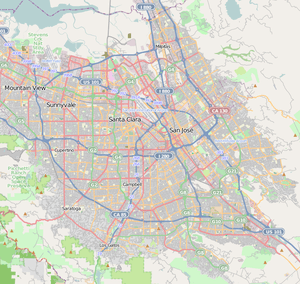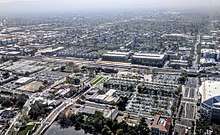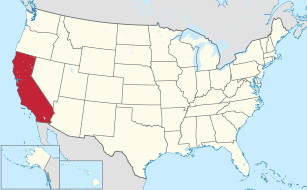San Jose Diridon station
San Jose Diridon | ||||||||||||||||||||||||||||||||||||||||||||||||||||||||||||
|---|---|---|---|---|---|---|---|---|---|---|---|---|---|---|---|---|---|---|---|---|---|---|---|---|---|---|---|---|---|---|---|---|---|---|---|---|---|---|---|---|---|---|---|---|---|---|---|---|---|---|---|---|---|---|---|---|---|---|---|---|
|
Diridon station | ||||||||||||||||||||||||||||||||||||||||||||||||||||||||||||
| Location |
65 Cahill Street San Jose, California | |||||||||||||||||||||||||||||||||||||||||||||||||||||||||||
| Coordinates | 37°19′48″N 121°54′11″W / 37.330°N 121.903°WCoordinates: 37°19′48″N 121°54′11″W / 37.330°N 121.903°W | |||||||||||||||||||||||||||||||||||||||||||||||||||||||||||
| Owned by | Peninsula Corridor Joint Powers Board | |||||||||||||||||||||||||||||||||||||||||||||||||||||||||||
| Line(s) | Peninsula Subdivision[1] | |||||||||||||||||||||||||||||||||||||||||||||||||||||||||||
| Platforms |
1 side platform, 4 island platforms (Amtrak/Caltrain/ACE) 2 side platforms (VTA Light Rail) | |||||||||||||||||||||||||||||||||||||||||||||||||||||||||||
| Tracks |
9 (Amtrak/Caltrain/ACE) 2 (VTA Light Rail) | |||||||||||||||||||||||||||||||||||||||||||||||||||||||||||
| Connections |
| |||||||||||||||||||||||||||||||||||||||||||||||||||||||||||
| Construction | ||||||||||||||||||||||||||||||||||||||||||||||||||||||||||||
| Parking | $5.50 per day (Caltrain only) | |||||||||||||||||||||||||||||||||||||||||||||||||||||||||||
| Bicycle facilities | Racks available (Caltrain) | |||||||||||||||||||||||||||||||||||||||||||||||||||||||||||
| Disabled access | Yes | |||||||||||||||||||||||||||||||||||||||||||||||||||||||||||
| Other information | ||||||||||||||||||||||||||||||||||||||||||||||||||||||||||||
| Station code |
SJC (Amtrak) SJD (ACE) | |||||||||||||||||||||||||||||||||||||||||||||||||||||||||||
| Fare zone | 4 (Caltrain) | |||||||||||||||||||||||||||||||||||||||||||||||||||||||||||
| History | ||||||||||||||||||||||||||||||||||||||||||||||||||||||||||||
| Opened |
December 1935 2005 (VTA light rail) | |||||||||||||||||||||||||||||||||||||||||||||||||||||||||||
| Opening |
2026 (BART) 2027 (High-Speed Rail) | |||||||||||||||||||||||||||||||||||||||||||||||||||||||||||
| Rebuilt | 1994 | |||||||||||||||||||||||||||||||||||||||||||||||||||||||||||
| Previous names | Cahill Depot | |||||||||||||||||||||||||||||||||||||||||||||||||||||||||||
| Traffic | ||||||||||||||||||||||||||||||||||||||||||||||||||||||||||||
| Passengers (2015) | 215,158[2] (Amtrak) | |||||||||||||||||||||||||||||||||||||||||||||||||||||||||||
| Passengers (2017) | 4712 per weekday[3] (Caltrain) | |||||||||||||||||||||||||||||||||||||||||||||||||||||||||||
| Services | ||||||||||||||||||||||||||||||||||||||||||||||||||||||||||||
| ||||||||||||||||||||||||||||||||||||||||||||||||||||||||||||
| ||||||||||||||||||||||||||||||||||||||||||||||||||||||||||||
|
Southern Pacific Depot | ||||||||||||||||||||||||||||||||||||||||||||||||||||||||||||
   | ||||||||||||||||||||||||||||||||||||||||||||||||||||||||||||
| Coordinates | 37°19′48″N 121°54′9″W / 37.33000°N 121.90250°W | |||||||||||||||||||||||||||||||||||||||||||||||||||||||||||
| Built | 1935 | |||||||||||||||||||||||||||||||||||||||||||||||||||||||||||
| Architect | John H. Christie | |||||||||||||||||||||||||||||||||||||||||||||||||||||||||||
| Architectural style | Italian Renaissance Revival | |||||||||||||||||||||||||||||||||||||||||||||||||||||||||||
| NRHP reference # | 93000274[4] | |||||||||||||||||||||||||||||||||||||||||||||||||||||||||||
| Added to NRHP | April 1, 1993 | |||||||||||||||||||||||||||||||||||||||||||||||||||||||||||
San Jose Diridon is the central passenger rail depot for San Jose, California. It also serves as a transit hub for Santa Clara County and Silicon Valley.
The station is on the Union Pacific Coast Line tracks (formerly Southern Pacific) at 65 Cahill Street in San Jose. The depot is listed on the National Register of Historic Places for its Italian Renaissance Revival style architectural and historical significance.
The station is served by Caltrain, ACE, VTA light rail, and Amtrak. This is in addition to bus services by California Shuttle Bus, Amtrak Thruway Bus, Monterey-Salinas Transit, Santa Cruz Metro (Highway 17 Express), local VTA and employer shuttles and buses.
Bay Area Rapid Transit (BART) metro service to a new underground station is projected to begin in 2026 with the completion of the Silicon Valley BART extension.[5]
History
The Cahill Depot opened in December 1935. The opening of the depot was the culmination of a 30-year effort to relocate 4.5 miles (7.2 km) of the Coast Line of the Southern Pacific Railroad away from the heavy traffic of the downtown area around the Market Street Depot,[6] located at Market and Bassett Streets, to the eastern edge of Willow Glen, an industrial area in the 19th century and the former location of rail facilities belonging to other railroads, in 1935. The new depot replaced the Fourth Street line's station.
The Cahill Depot was a stop for several Southern Pacific passenger trains, including the famous San Francisco–Los Angeles train, the Coast Daylight. Other "named" trains that used the station were the all first-class Lark, and the Del Monte. Amtrak took over long distance passenger train service in 1971, and Caltrain equipment replaced all SP passenger equipment on the Peninsula Commute in 1985.
Restoration of the station was finished in 1994, when the station was renamed Diridon Station after former Santa Clara County Supervisor Rod Diridon.[7]
In 1996, Santa Clara County voters approved a half cent sales tax to fund the 1996 Measure B Transportation Improvement Project. Part of this project was the construction of the Vasona Light Rail extension which included a VTA light rail platform at the Diridon train depot.[8] The official opening date for this light rail extension was October 1, 2005, however, revenue service at the San Fernando and Diridon Stations began on July 29, 2005 to accommodate attendees of the inaugural San Jose Grand Prix race.
The passenger platform was featured in the opening scene of Alfred Hitchcock's Marnie (1964) as representing the Hartford, Connecticut, train station. Margaret (Marnie) Edgar (Tippi Hedren) is seen walking down the platform, back to the camera with a yellow purse tucked under her left arm and carrying a suitcase with her right, setting down the suitcase and waiting for her train to arrive.
Ridership
Of Amtrak's 74 California stations, San Jose was the 19th-busiest in FY2010, boarding or detraining an average of approximately 643 passengers daily.[9]
Architecture
The depot is in the Italian Renaissance Revival style, with a three-story central section flanked by two-story wings. The building, a compilation of rectangular sections, is 390 feet (118 m) long and 40 feet to 78 feet (12 to 24 m) wide. The central section, which contains the passenger waiting room, measures 40 by 80 feet (12 by 25 m) and is 33 feet (10 m) high. The high center pavilion housing the waiting room is constructed of steel columns and trusses. The side wings are framed with wood. The exterior walls are clad with tapestry brick or varied colors and arranged in an English bond pattern. The depot is in an industrial area formerly dominated by warehouses and related commercial businesses. Several vernacular sheds, a water tower, butterfly passenger sheds and the nearby Alameda underpass are all contributing buildings and structures within the railroad station.
The building was designed by Southern Pacific architect, John H. Christie, who had worked on the Southern Pacific remodeling of the Fresno depot in 1915 and later, in 1939, worked on Union Station in Los Angeles. This depot is one of only four Italian Renaissance Revival style depots in California, and the largest surviving depot of the San Francisco–San Jose line. The only other large depot built in California during the 1930s was the Los Angeles Union Passenger Terminal.
Platforms and tracks
| Tracks 1-9 | Side platform, doors will open on the left | |
| Northbound | ← ACE toward Stockton (Santa Clara) | |
| Northbound | ← Capitol Corridor toward Auburn (Santa Clara) | |
| Island platform, doors will open on the right | ||
| Northbound | ← Coast Starlight toward Seattle (Oakland–Jack London Square) | |
| Southbound | Coast Starlight toward Los Angeles (Salinas) → | |
| Island platform, doors will open on the right | ||
| Northbound | ← Local toward San Francisco (College Park or Santa Clara) | |
| Northbound | ← Limited-stop toward San Francisco (Santa Clara or Sunnyvale) | |
| Island platform, doors will open on the left, right | ||
| Northbound | ← Baby Bullet toward San Francisco (Sunnyvale or Mountain View) ← Baby Bullet Peak Pattern B toward San Francisco (Palo Alto) | |
| Southbound | Local toward Gilroy (Tamien) → Limited-stop toward Gilroy at peak hours or toward Tamien (Terminus) at non-peak hours → | |
| Island platform, doors will open on the left, right | ||
| Southbound | Baby Bullet Peak Pattern B toward Tamien (Terminus) → | |
| VTA | Side platform, doors will open on the right | |
| Northbound | ← Mountain View–Winchester toward Mountain View (San Fernando) | |
| Southbound | Mountain View–Winchester toward Winchester (Race) → | |
| Side platform, doors will open on the right | ||
Transit connections
- VTA Route 22
- VTA Route 63
- VTA Route 64
- VTA Route 65
- VTA Route 68
- VTA Express Route 181
- VTA Route 201 Downtown Area Shuttle (DASH) (free)
- VTA Rapid Route 522
- Highway 17 Express - VTA's site
- Highway 17 Express - Santa Cruz Metro's site
- MST Route 55
- MST Route 86
- Amtrak Thruway Bus - San Joaquin Route
- Tamien/S.J. Diridon Weekends Shuttle
Future BART and California High-Speed Rail service

The San Jose Diridon station is planned as a future stop on the California High-Speed Rail line and Phase 2 of VTA's Silicon Valley San Jose BART extension in Santa Clara County. The high-speed rail track and platform locations have not been determined yet.
The BART station will be called Diridon and planned to be a subway station adjacent to the train station and Santa Clara Street. It will be located between the Santa Clara and Downtown San Jose BART stations with direct service to Santa Clara, San Francisco/Daly City (via the East Bay), and Richmond.[5]
If these plans are completed, Diridon station would offer connections between six agencies' rail services: ACE, Amtrak's Capitol Corridor and Coast Starlight lines, BART, Caltrain, CHSR, and VTA light rail.
In 2009, the City of San Jose partnered with the Harvard University Graduate School of Design to study transportation and urban planning issues surrounding such a large-scale transit hub.[10]
Diridon station track layout | |||||||||||||||||||||||||||||||||||||||||||||||||||||||||||||||||||||||||||||||||||||||||||||||||||||||||||||||||||||||||||||||||||||||||||||||||||||||||||||||||||||||||||||||||||||||||||||||||||||||||||||||||||||||||||||||||||||||||||||||||||||||||||||||||||||||||||||||||||||||||||||||||||||||||||||||||||||||||||||||||||||||||||||||||||
|---|---|---|---|---|---|---|---|---|---|---|---|---|---|---|---|---|---|---|---|---|---|---|---|---|---|---|---|---|---|---|---|---|---|---|---|---|---|---|---|---|---|---|---|---|---|---|---|---|---|---|---|---|---|---|---|---|---|---|---|---|---|---|---|---|---|---|---|---|---|---|---|---|---|---|---|---|---|---|---|---|---|---|---|---|---|---|---|---|---|---|---|---|---|---|---|---|---|---|---|---|---|---|---|---|---|---|---|---|---|---|---|---|---|---|---|---|---|---|---|---|---|---|---|---|---|---|---|---|---|---|---|---|---|---|---|---|---|---|---|---|---|---|---|---|---|---|---|---|---|---|---|---|---|---|---|---|---|---|---|---|---|---|---|---|---|---|---|---|---|---|---|---|---|---|---|---|---|---|---|---|---|---|---|---|---|---|---|---|---|---|---|---|---|---|---|---|---|---|---|---|---|---|---|---|---|---|---|---|---|---|---|---|---|---|---|---|---|---|---|---|---|---|---|---|---|---|---|---|---|---|---|---|---|---|---|---|---|---|---|---|---|---|---|---|---|---|---|---|---|---|---|---|---|---|---|---|---|---|---|---|---|---|---|---|---|---|---|---|---|---|---|---|---|---|---|---|---|---|---|---|---|---|---|---|---|---|---|---|---|---|---|---|---|---|---|---|---|---|---|---|---|---|---|---|---|---|---|---|---|---|---|---|---|---|---|---|---|---|---|---|---|---|---|---|---|---|---|---|---|---|---|---|---|---|---|---|---|---|---|
| |||||||||||||||||||||||||||||||||||||||||||||||||||||||||||||||||||||||||||||||||||||||||||||||||||||||||||||||||||||||||||||||||||||||||||||||||||||||||||||||||||||||||||||||||||||||||||||||||||||||||||||||||||||||||||||||||||||||||||||||||||||||||||||||||||||||||||||||||||||||||||||||||||||||||||||||||||||||||||||||||||||||||||||||||||
See also
Footnotes
- ↑ SMA Rail Consulting (April 2016). "California Passenger Rail NETWORK SCHEMATICS" (PDF). California Department of Transportation. p. 13.
- ↑ "Amtrak Fact Sheet, Fiscal Year 2015 - State of California" (pdf). Amtrak. November 2015. Retrieved 2015-12-11.
- ↑ "2017 Annual Count Key Findings Report" (PDF). Peninsula Corridor Joint Powers Board. 2017.
- ↑ National Park Service (2006-03-15). "National Register Information System". National Register of Historic Places. National Park Service.
- 1 2 BART Silicon Valley Fact Sheet Archived 2010-07-11 at the Wayback Machine.. VTA - BART Silicon Valley, 2011.
- ↑ San Jose's Market Street Depot
- ↑ http://www.caltrain.com/caltrain_history.html
- ↑ "Vasona Project Description". Completed projects. Santa Clara Valley Transportation Authority. 2008-09-15. Retrieved 2008-11-16.
- ↑ "Amtrak Fact Sheet, FY2012, State of California" (PDF). November 2012. Retrieved 2013-05-11.
- ↑ "Diridon Station to Be Focus of Harvard Design Group" (Press release). City of San Jose. 2009-02-10. Retrieved 2016-03-26.
References
- "Southern Pacific Depot". California's Historic Silicon Valley. National Park Service. Retrieved 2007-03-09.
External links
| Wikimedia Commons has media related to San Jose Diridon station. |
- Caltrain San Jose Diridon station page
- Altamont Corridor Express
- Amtrak California
- Amtrak
- Santa Clara Valley Transportation Authority (VTA)
- Santa Cruz Metropolitan Transit District (Highway 17 Express)
- Transit Unlimited — San Jose Diridon Station
- San Jose (SJC) — Great American Stations (Amtrak)
- San Jose multimodal transportation terminal: environmental impact statement (Report). US Department of Transportation, Urban Mass Transportation Administration. September 1984. Retrieved 15 July 2016.
![]()



